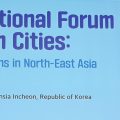UrbanShift 1st National-Local Dialogue in China

Overview
The national-local dialogue addressed significant themes concerning urban biodiversity and low-carbon development. The dialogue involved extensive discussions to align national and local strategies for ecological and sustainable urban development.
- Urban Biodiversity: Emphasis was laid on integration of biodiversity conservation into urban planning, which should also consider urban natural assets and ecosystems, their economic value, and co-benefits for climate change.
- Low-Carbon Development: Urban planning’s role in supporting carbon neutrality and peak goals was emphasized. Concepts such as green and low-carbon urban development, climate resilience and energy-saving technologies, along with the need for development of sustainable financing models for low-carbon transitions.
Topic of First National-Local Dialogue: Supporting urban biodiversity and low carbon urban development in the 3 selected cities in China
Level of Representation:
- National government representatives – Ministry of Finance, China Center for Urban Development
- Local government representatives from three cities – Chengdu, Chongqing and Ningbo
- Other Representatives from UN agencies, research institutes, MDBs, and NGOs
How the National-Local Dialogue Contributed to Existing Policy
National level
The discussions held at the National Local Dialogue helped to enhance existing policies related to urban biodiversity and low-carbon development through several key contributions:
Strengthening Policy Alignment: The dialogue helped to foster better alignment between national policies and local implementation strategies. By bringing together representatives from national bodies and major cities, the discussions helped to ensure that local actions are in line with national objectives, particularly China’s carbon peak and neutrality goals.
Enhancing Biodiversity Conservation: Urban biodiversity initiatives discussed during the dialogue contribute to the existing national policy framework by highlighting the need for innovative approaches to urban planning. The dialogue’s focus on integrating biodiversity into urban development plans complements national policies aimed at preserving ecological systems and promoting sustainable urban growth.
Promoting Low-Carbon Urban Development: The dialogue supports the implementation of China’s national low-carbon policies by identifying practical strategies for cities to adopt. The emphasis on green and low-carbon urban design, climate resilience, and energy-saving technologies aligns with the national commitment to reduce greenhouse gas emissions and transition to a sustainable energy system.
Facilitating Sustainable Financing: By addressing the need for sustainable financing models, the dialogue contributes to national policies focused on environmental and economic sustainability. Encouraging private sector investment in biodiversity and low-carbon projects aligns with national efforts to diversify funding sources and reduce reliance on public budgets.
Building Capacity and Knowledge Sharing: The dialogue provides a platform for knowledge exchange and capacity building among national and local stakeholders. Sharing best practices and innovative solutions contributes to the refinement and improvement of existing policies, making them more adaptable to local contexts and challenges.
Local Level
At the local level, the National-Local Dialogue in China played a crucial role in enhancing and implementing policies related to urban biodiversity and low-carbon development. The contributions include:
- Localized Implementation of National Goals: The discussions at the dialogue helped local governments understand and apply national goals, such as carbon peak by 2030 and carbon neutrality by 2060, within their unique urban contexts. This ensures that local policies are effectively contributing to broader national objectives.
- Tailored Urban Biodiversity Strategies: The discussions provide local authorities with insights on integrating biodiversity into urban planning. This includes developing specific strategies to address local challenges, such as high population density and limited green spaces, thereby enriching local biodiversity policies and making them more effective and context-sensitive.
- Innovative Financial Mechanisms: By emphasizing the importance of private sector involvement, the dialogue encourages local governments to explore new financing models for biodiversity and low-carbon projects. This reduces dependency on public funds and promotes sustainable investment practices at the local level.
- Enhanced Urban Planning Practices: The dialogue promotes best practices in urban planning that prioritize ecological and low-carbon development. Local governments are encouraged to adopt comprehensive planning approaches that incorporate green spaces, energy-efficient buildings, and sustainable transportation systems, aligning local plans with national sustainability goals.
- Capacity Building and Knowledge Sharing: Local policymakers and planners benefit from the exchange of knowledge and experiences during the dialogue. Learning from other cities and experts helps local authorities build capacity, refine their policies, and implement innovative solutions that have been successfully tested elsewhere.
- Improved Governance and Coordination: The dialogue fosters better coordination between local governments and other stakeholders, including national agencies and the private sector. This improved governance framework enhances the implementation of local policies, ensuring that they are coherent with national strategies and benefit from broader support and resources.
- Public Engagement and Awareness: The dialogue underscores the need for public engagement in local policy implementation. By raising awareness and involving communities in sustainability efforts, local policies gain greater support and effectiveness, fostering a culture of environmental stewardship.
Outlook for the Second National-Local Dialogue
The second National-Local Dialogue aims to further assess and support actions to be implemented in the short and medium term to achieve tangible results as part of the project. The following were identified as next steps and will be addressed in the Second National-Local Dialogue.
- Enhanced Coordination and Communication: Improving coordination between national and local governments is crucial. This will ensure that policies are implemented effectively and consistently across all levels.
- Innovative Financing Models: Exploring sustainable financing models and attracting private sector investment are essential to support large-scale projects like the Sponge City programme. This will require a collaborative approach involving various stakeholders.
- Data and Technical Capacity Building: Investing in the development of comprehensive data pools and technical expertise is vital. Training programs and knowledge-sharing platforms can help local governments build the necessary skills for effective policy implementation.
- Policy Integration and Localization: Continued efforts are needed to integrate national policies into local contexts. Tailored approaches can help balance urban growth with sustainability goals.
Conclusion
The National-Local Dialogue in China provided a critical platform for addressing the complex challenges and unlocking the vast opportunities in urban biodiversity and low-carbon development. Through robust discussions, it became evident that while the localization of national policies at provincial, municipal, and district levels has been effective, integrated implementation remains a pressing challenge. Financial constraints, technical and data deficiencies, and the complexities of internal migration policies add layers of difficulty. However, the dialogue also highlighted significant opportunities, such as leveraging the National Territorial and Spatial Planning 2019, scaling up the Sponge City programme, and integrating nature-based solutions into urban planning. The commitment from twelve cities to develop Carbon Neutrality Action Plans and the potential for UrbanShift cities to lead by example underscore a collective momentum towards sustainable urbanization. Moving forward, the focus must be on enhancing coordination, exploring innovative financing, building technical capacities, and ensuring continuous monitoring and evaluation to achieve China’s ambitious sustainability goals. The dialogue has set a foundation for ongoing collaboration and action, aiming to harmonize national and local efforts in creating resilient, sustainable urban environments.
Article summarized by Pratibha Caleb



